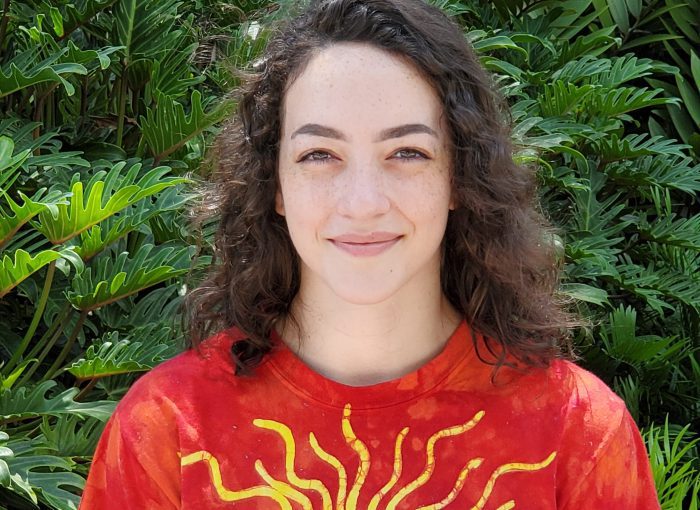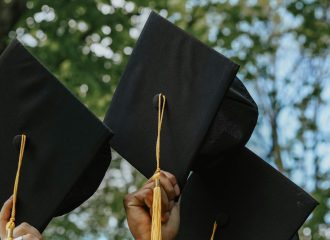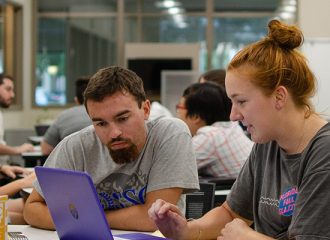by Pamela Gores
At UCF with an enrollment of 70,000 students comes 70,000 stories, each one complex in its own right. In searching for one of these unique stories, I met with Kelsey Rodriguez, who not only was eager to share her success through IMPRINT but was willing to reveal how she became one of UCF’s finest. Her story turned out to be quite simple: she graduated with a class of 16 in Puerto Rico and decided to come to UCF to “save the world” with not a single credit to her name.
On a Wednesday afternoon, one of the rare sunny ones this summer, in the Starbucks located on Memory Mall, I sat down with Kelsey so that she could tell me her story.
When asked why she chose environmental engineering as a major, she answers in the midst of a short laugh. “I picked [environmental] engineering because I like math. I didn’t really know much about the topic and then I was literally Googling one day and started typing ‘different types of engineering’ and I came across environmental and I was like, “Oh! I like the planet, I like nature.” I just like the idea of doing as much as you can for the Earth.”
It is Kelsey’s nonlinear path which further caught IMPRINT’s attention. Having never taken chemistry, physics, or upper-division math courses in high school, Kelsey came to UCF during the fall 2015 semester as a “blank slate” for her major. However, in the past year alone she’s received the Undergraduate Student Award in Environmental Chemistry from the American Chemical Society (ACS) and a grant from the 15th annual P3 Award held by the Environmental Protection Agency (EPA).
The Undergraduate Student Award in Environmental Chemistry was given to Kelsey after an extensive nomination and selection process, all of which was initiated by Dr. Woo Hyoung Lee of the Civil Environmental and Construction Department at UCF. In order to be eligible, a student must have completed one full year of study at their current institution by May of the respective year. Only one award per department at an educational institution is given to an outstanding full-time undergraduate student. The award consists of a certificate (pictured below) and a one year membership in the ACS Division of Environmental Chemistry. Since 2007 only two UCF students have received this award, Kelsey included.
On the other hand, the P3 Award is from a national student design competition that focuses on the 3 P’s: People, Planet, and Prosperity. After passing through the initial research phase (Phase l), Kelsey, Dr. Lee, and other students and staff in the department were chosen as a group (also pictured below) to receive the grant. The grant will fund their idea of creating a sponge that will potentially create cleaner drinking water and reverse oil spill damage. Following prior years’ statistics, approximately only twenty teams in the country are approved for Phase l, and of those twenty only three progress to Phase ll each year.
With these two awards under her belt, it’s safe to say that Kelsey’s mission in saving the world is well underway.
Prior to these accolades Kelsey started small when she arrived at UCF. She joined Out of State Student Mentoring (OSSM), the Society for Environmental Engineering, Engineering Without Borders, and Girls Excelling in Math and Science (GEMS), and the EXCEL program, eager to immerse herself in her new community.
The interview seems like a walk down memory lane as she reminisces about her earlier years at UCF. “I’ve been relatively proactive since I came to UCF. I think the first year I didn’t do anything other than go to classes and as soon as the second year hit, I started joining clubs and started doing research and started everything I could. Since then, I’ve never not done anything. I’m always busy, always involved in something…And I think that’s why [I was recognized].”
Her hustle came with success, and her recognition was earned earlier this spring after she and Dr. Lee invented and patented a water sensor that detects heavy metals in drinking water.
“The idea came from the Flint crisis. For them it was lead that got into their drinking water and it was like a mass exposure and the idea behind ours was that you’d have a little sensor that can quickly tell whether there’s heavy metals in your water so you prevent the mass exposure.”
Success hasn’t come easily, however. Being a female who’s excelling in a predominantly male field yields a set of inevitable challenges. Some subtle, some not. Kelsey recalls multiple times when she was doubted by her mentors and peers based on gender alone, despite having proven herself with her grades and GPA.
She shrugs a bit and matter-of-factly states, “They just assume that I don’t know that much.”
Nevertheless Kelsey has a strong support system comprised of both fellow students and professors, female and male. No matter the underlying pressure of “saying something stupid” in class in fear of “different reactions” or underperforming in the field when compared to men, she is not letting anything hold her back. Instead, she’s formed an awareness that she plans to carry with her beyond UCF.
Pride aside, Kelsey dons a more inquisitive expression when thinking about where her career is leading her towards. “I’ll have to be more careful and look out for it [the discrimination], but I think as long as I continue to improve myself I won’t have to think too much about it. But there will definitely be times where it’s more of a first impression thing, where they don’t know my ability and I’ll have to stand up for myself first.”
With a support system behind her, Kelsey has also reached great heights because she believes in herself, and the initiative to search and ask for what she wants. Her main advice for anyone looking to follow in her footsteps? Be proactive and work hard.
As she grips her cup of coffee, Kelsey now gives me a small, determined grin when she says, “UCF stands for opportunity. You can go to any door, any building, and knock on it and just ask, “Hey, what can you do for me?” You just have to be proactive about it. You can’t just sit there and expect someone else do it. It [success] requires to put in work. There’s no easy way around it.”
Before I can get to the next question she hurriedly adds on, “Don’t be doing nothing. Don’t be the basic student who just goes to class. Find something else.”
Kelsey came to UCF with one mission in mind: saving the world. She thought her story would consist of just that, but in time she discovered that everything this story would entail would become much more important than the mission at hand. She became excellent not only in regards to her stellar academics and achievements, but excellent in that she’s found significance between herself and the world she’s about to step into when she graduates this fall.
Rather than admit defeat her voice is as victorious as ever as she declares, “My initial thing was “save the world,” but no, I’m not going to save the world anymore. But I definitely will be able to contribute.”
At the end of our interview, Kelsey has taught me one thing above all us; that excellence doesn’t have a singular definition or image. Before meeting her, I thought someone could be excellent based on academic merit alone, but in the span of forty minutes in the middle of a bustling Starbucks I was proven wrong. Excellence comes from within, and from how it is projected into the world. Luckily for our world, Kelsey’s excellence is glistening.






